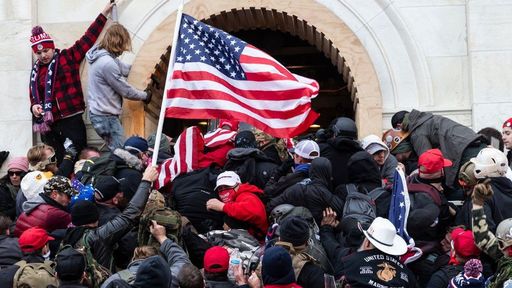On civil war – Ross Douthat in NYT:
‘“How Civil Wars Start,” a new book by the political scientist Barbara F. Walter, was cited all over the place in the days around the anniversary of last winter’s riot at the Capitol. The New Yorker’s David Remnick, Vox’s Zack Beauchamp and my colleague Michelle Goldberg all invoked Walter’s work in essays discussing the possibility that the United States stands on the edge of an abyss, with years of civil strife ahead.
The book begins with a story from the fall of 2020: the kidnapping plot against Gov. Gretchen Whitmer of Michigan, hatched by a group of right-wing militiamen who opposed Whitmer’s pandemic restrictions. Fortunately “the F.B.I. was on to them” and foiled the plot, but the alleged kidnapping conspiracy, Walter argues, is a harbinger of worse to come. Periods of civil war often “start with vigilantes just like these — armed militants who take violence directly to the people.”
Here’s a skeptical question, though: When we say the F.B.I. was “on to” the plotters, what exactly does that mean? Because at the moment, the government’s case against them is a remarkable tangle. Fourteen men have been charged with crimes, based in part on evidence reportedly supplied by at least 12 confidential informants — meaning that the F.B.I. had almost one informant involved for every defendant.
And according to reporting from BuzzFeed’s Jessica Garrison and Ken Bensinger, one of these informants, an extremely colorful felon named Stephen Robeson, appears to have been a crucial instigator of the plot. He is alleged to have used government funds to pay for meals and hotel rooms, encouraged people “to vent their anger about governors who enacted Covid-19 restrictions” and “to plan violent actions against elected officials and to acquire weapons and bomb-making materials” and followed up aggressively, calling potential plotters “nearly every day.”
Robeson’s role has become enough of a headache for the prosecutors, in fact, that they recently disowned him, declaring that he was actually a “double agent” (meaning triple agent, I think) who betrayed his obligations as an informant by trying to destroy evidence and seeking to warn one of the accused conspirators ahead of his arrest.’
(…)
‘Likewise, despite fears that Jan. 6 was going to birth a “Hezbollah wing” of the Republican Party, there has been no major far-right follow-up to the event, no dramatic surge in Proud Boys or Oath Keepers visibility, no campaign of anti-Biden terrorism. Instead, Republicans who believe in the stolen-election thesis seem mostly excited by the prospect of thumping Democrats in the midterms, and the truest believers are doing the extremely characteristic American thing of running for local office.
This has prompted a different liberal fear — that these new officeholders could help precipitate a constitutional crisis by refusing to do their duty in a close election in 2024. But that fear is an example of the other problem of exaggeration in the imminent-civil-war literature, the way the goal posts seem to shift when you question the evocations of Fort Sumter or 1930s Europe.
Thus we are told that some kind of major democratic breakdown is likely “absent some radical development” (as Beauchamp puts it), that we are already “suspended between democracy and autocracy” (as Remnick writes) and that “the United States is coming to an end” and the only question “is how” (to quote the beginning of Stephen Marche’s new book, “The Next Civil War”). But then it turns out that the most obvious danger is an extremely contingent one, involving a cascade of events in 2024 — a very specific sort of election outcome, followed by a series of very high-risk, unusual radical choices by state legislators and Republican senators and the Supreme Court — that are worth worrying about but not at all the likeliest scenario, let alone one that’s somehow structurally inevitable.’
(…)
‘I am very aware that I’m always the columnist making some version of this calm-down argument, sometimes to a fault. So I want to stress that the problems that undergird the civil-war hypothesis are serious, the divisions in our country are considerable and dangerous, the specific perils associated with a Trump resurgence in 2024 are entirely real.
But there are also lots of countervailing and complicating forces, and the overall picture is genuinely complex — at least as complex, let’s say, as the informant-riddled plot against Gretchen Whitmer. And as with that conspiracy, it’s worth asking whether the people who see potential insurrection lurking everywhere are seeing a danger rising entirely on its own — or in their alarm are helping to invent it.’
Read the article here.
I’m mostly on Douthat’s side. The fear for another civil war in the US is sometimes hardly distinguishable from the desire that it will start at our earliest convenience, next Monday around noon.
The stolen election-myth is troublesome, the fact that this myth moved from the periphery into the center of politics and society, is more than troublesome, but this alone is not enough for a civil war.
There are 120 civilian arms per 100 citizens in the US, compared to 20 in Germany and less than 3 in the Netherlands (source: Wikipedia) but the willingness to use violence in the US not as high as some experts believe it is. That the willingness is rising, in Europa and elsewhere is true, but the desire to become a martyr is not yet widespread. The suicidal bloodthirst is less widespread, of course violence can easily become contagious (Girard), but a democracy with deep flaws is not the same as a prelude to a civil war.
